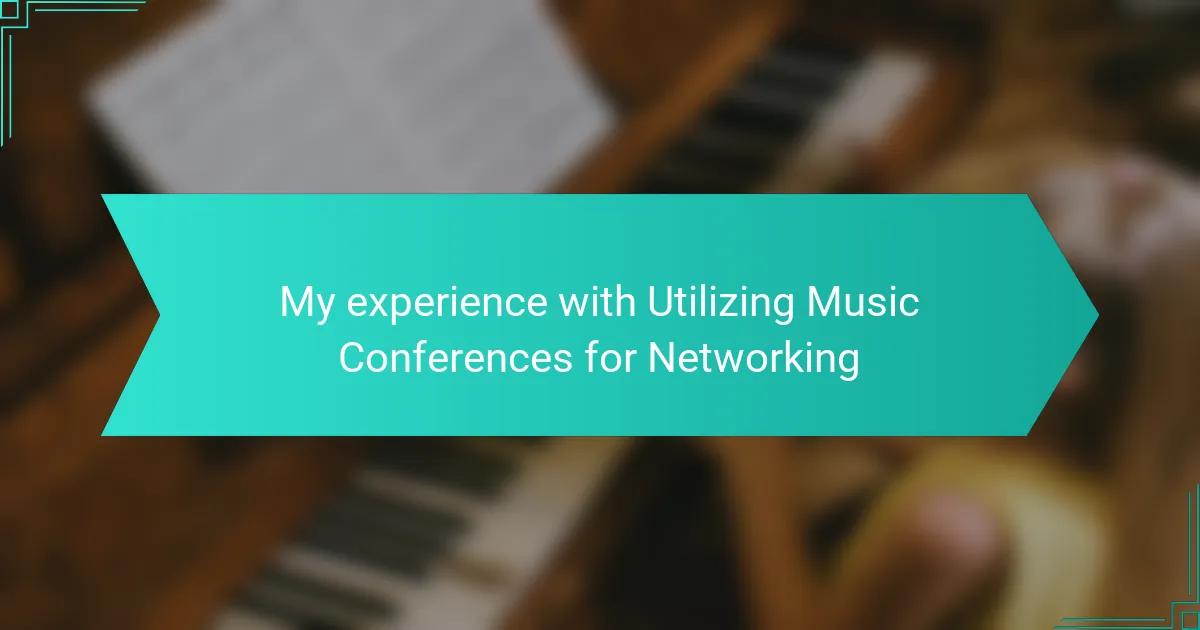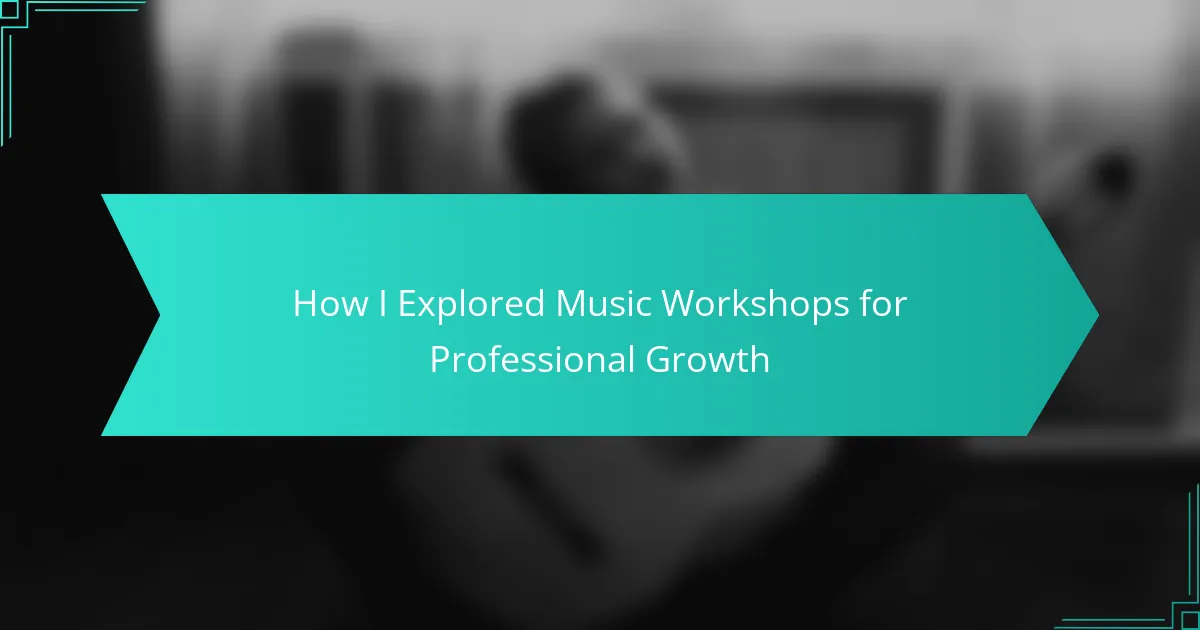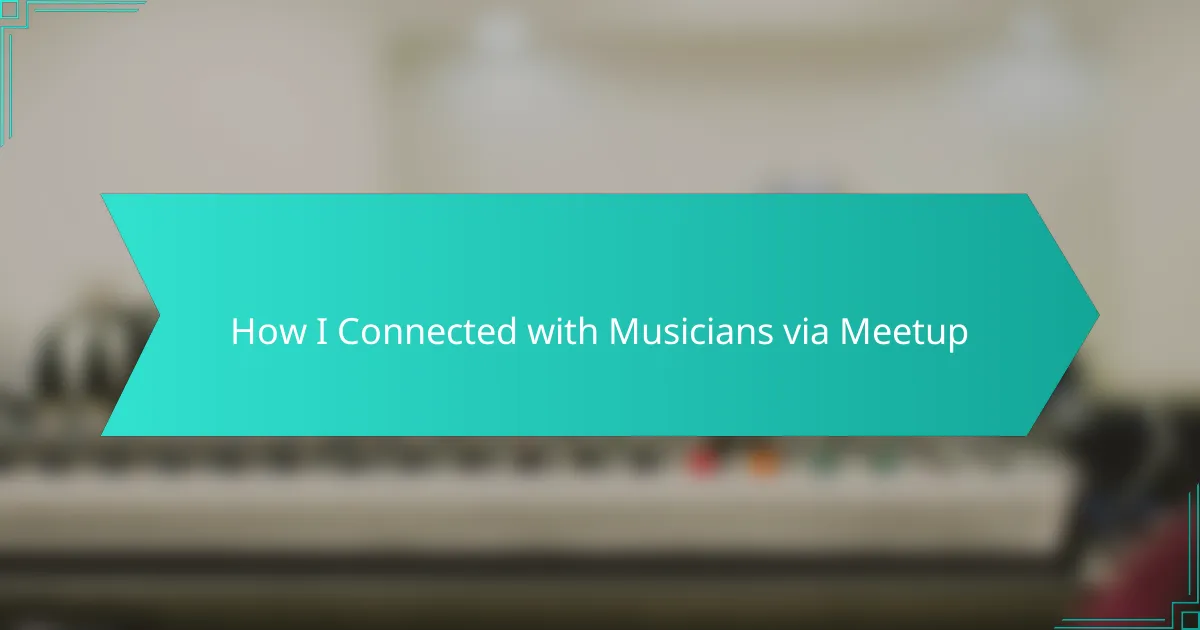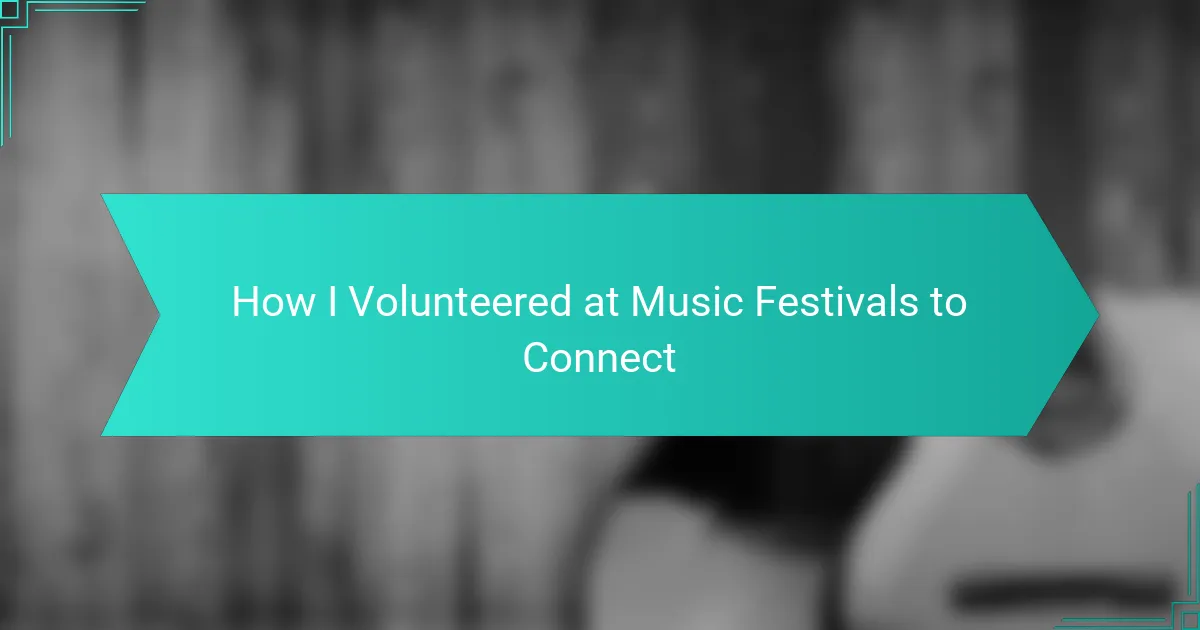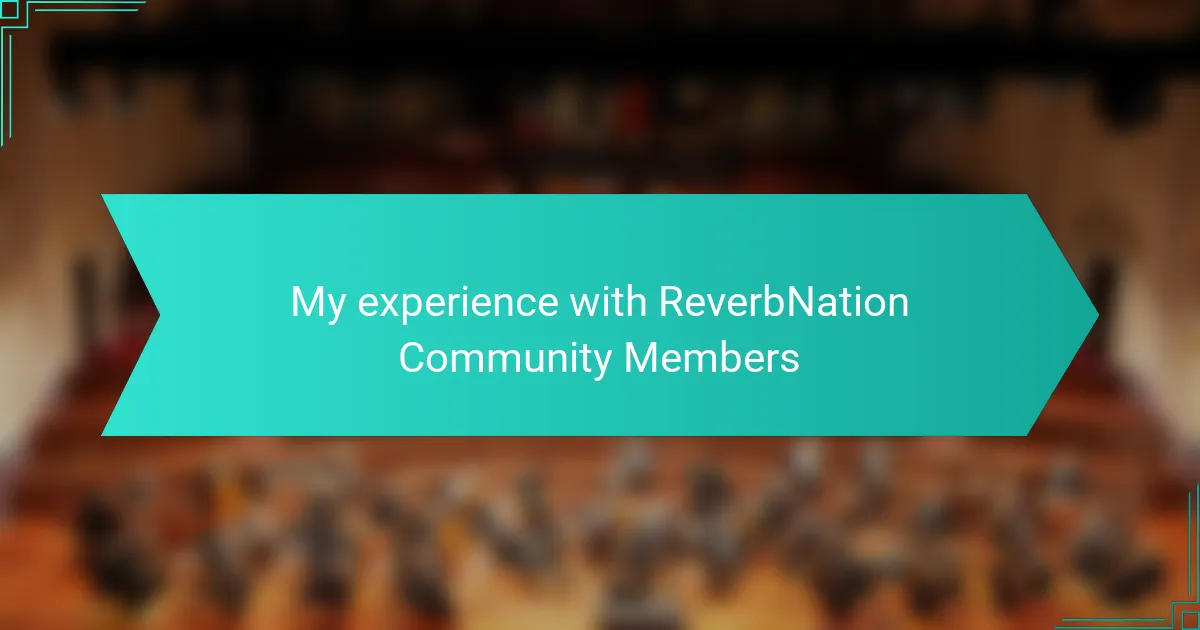Key takeaways
- Music conferences are vital for networking, offering opportunities for collaboration and creative growth among artists and industry professionals.
- Effective preparation and strategies, such as setting realistic networking goals and actively participating in workshops, can enhance the conference experience.
- Personal connections made at conferences can lead to significant professional opportunities, as demonstrated by spontaneous interactions and follow-ups.
- Being open, approachable, and a good listener fosters meaningful relationships that can lead to future collaborations and career advancements.
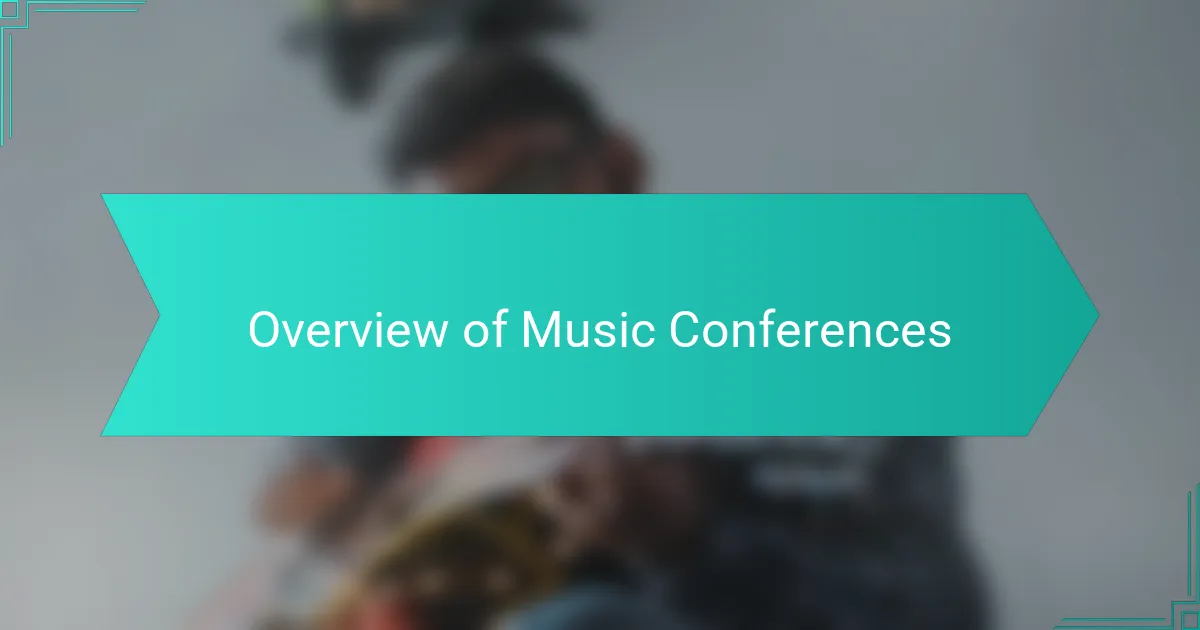
Overview of Music Conferences
Music conferences are vibrant hubs where artists, industry professionals, and enthusiasts converge to share knowledge, ideas, and opportunities. Having attended several of these events, I can tell you that the energy in the room is palpable. They serve not just as educational platforms but as critical networking venues that can significantly boost one’s music career. I remember the thrill of meeting music producers and fellow musicians, each interaction bursting with potential.
At a typical music conference, you’ll find panel discussions, workshops, and ample networking sessions. Artists can gain insights from industry veterans while also striking up collaborations with peers. For example, at a recent conference, I met a songwriter whose style complemented mine perfectly, leading to a fruitful partnership. Such unexpected connections can ignite new creative ventures.
Here’s a comparison of some notable music conferences:
| Conference Name | Key Features |
|---|---|
| South by Southwest (SXSW) | Diverse music genres, showcases, panels, and extensive exposure. |
| Austin City Limits (ACL) | Focus on live performances and audience engagement, great for networking. |
| The Grammy Museum | Educational programs, workshops, and insights from industry leaders. |
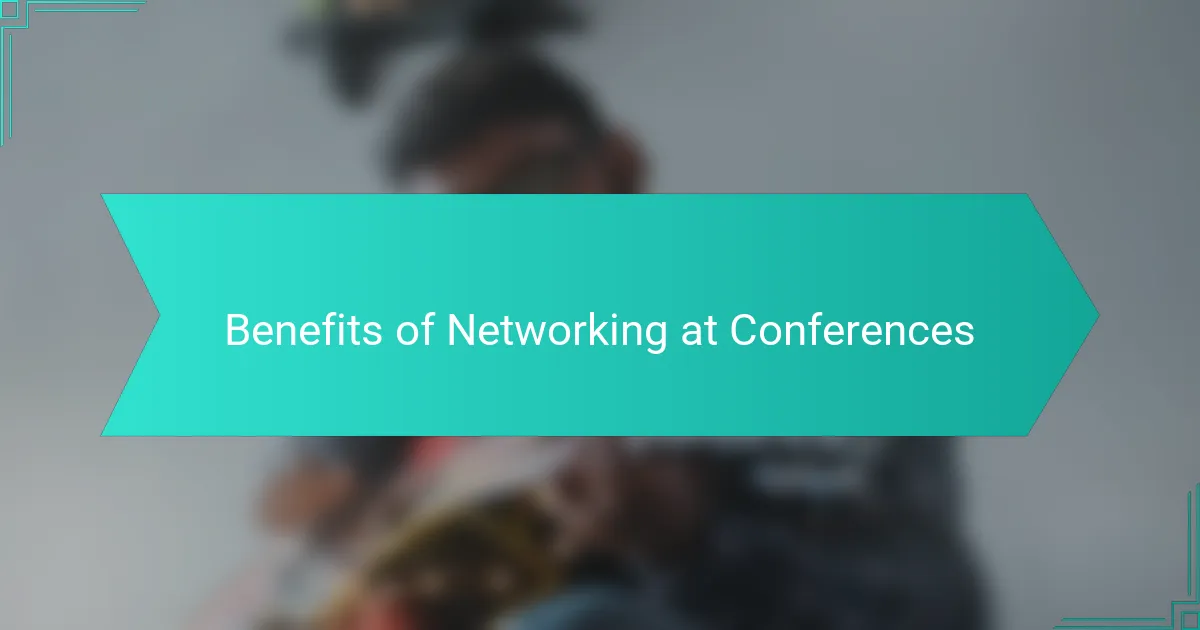
Benefits of Networking at Conferences
Attending music conferences has opened countless doors for me, both creatively and professionally. Each interaction has the potential to lead to new collaborations and friendships, enriching my musical journey. For instance, I once struck up a conversation with a fellow musician during a workshop, and that casual exchange evolved into a co-writing opportunity that has significantly impacted my career.
Here are some key benefits of networking at conferences:
- Expanded Connections: Meeting industry professionals can lead to valuable contacts in management, production, and promotion.
- Collaborative Opportunities: You might find artists interested in collaborating, which can enhance your music’s reach and diversity.
- Inspiration and Motivation: Engaging with peers can ignite fresh ideas and reignite your passion for music.
- Learning and Growth: Networking often leads to mentorship, allowing you to gain insights from experienced musicians and professionals.
- Visibility and Exposure: Building relationships can help you share your work with a broader audience, potentially leading to new fans.
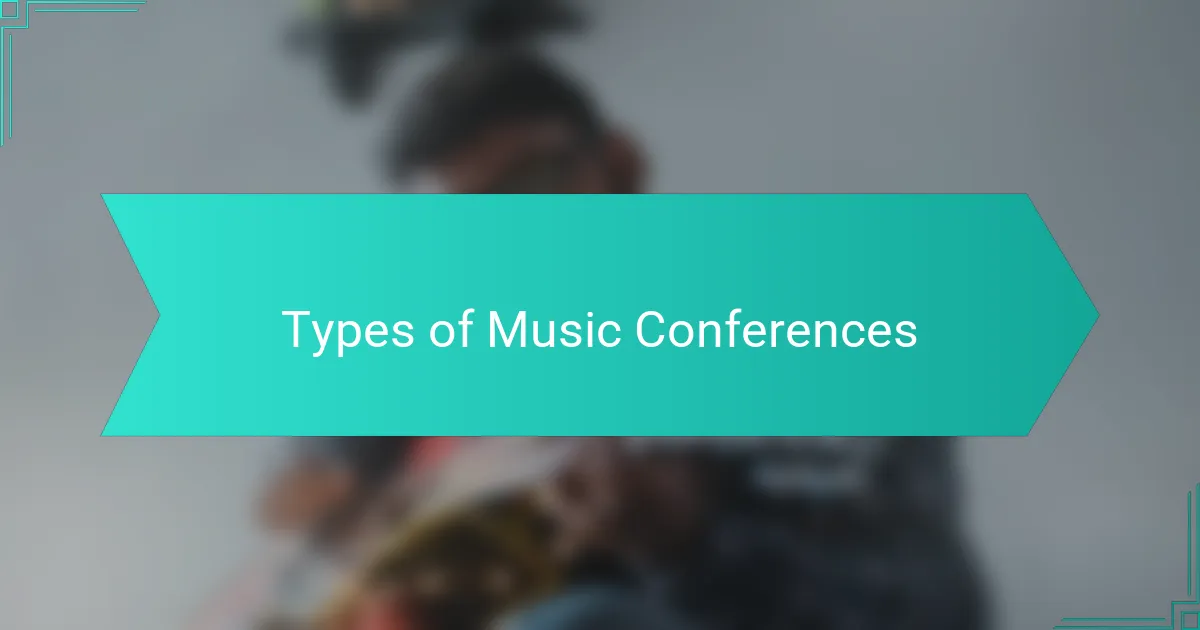
Types of Music Conferences
Music conferences come in various formats, and each serves a unique purpose in advancing your career. I’ve attended a wide range, from industry expos to niche genre festivals. Each one offers distinct opportunities for networking, learning, and collaboration.
I remember my first experience at a large industry expo. The buzz was electric, filled with professionals from every corner of the music world. Conversely, smaller, genre-specific conferences foster a more intimate setting, allowing for deeper connections with like-minded artists and industry insiders.
Here’s a comparison of different types of music conferences I’ve encountered, highlighting their unique attributes:
| Type of Conference | Description |
|---|---|
| Industry Expo | Large gatherings with a wide array of professionals, including panels and exhibition spaces for networking. |
| Genre-Specific Festival | Focused on a particular genre, these offer networking opportunities with niche artists and industry experts. |
| Workshops and Masterclasses | Interactive sessions led by music industry veterans, perfect for skill development and forging connections. |
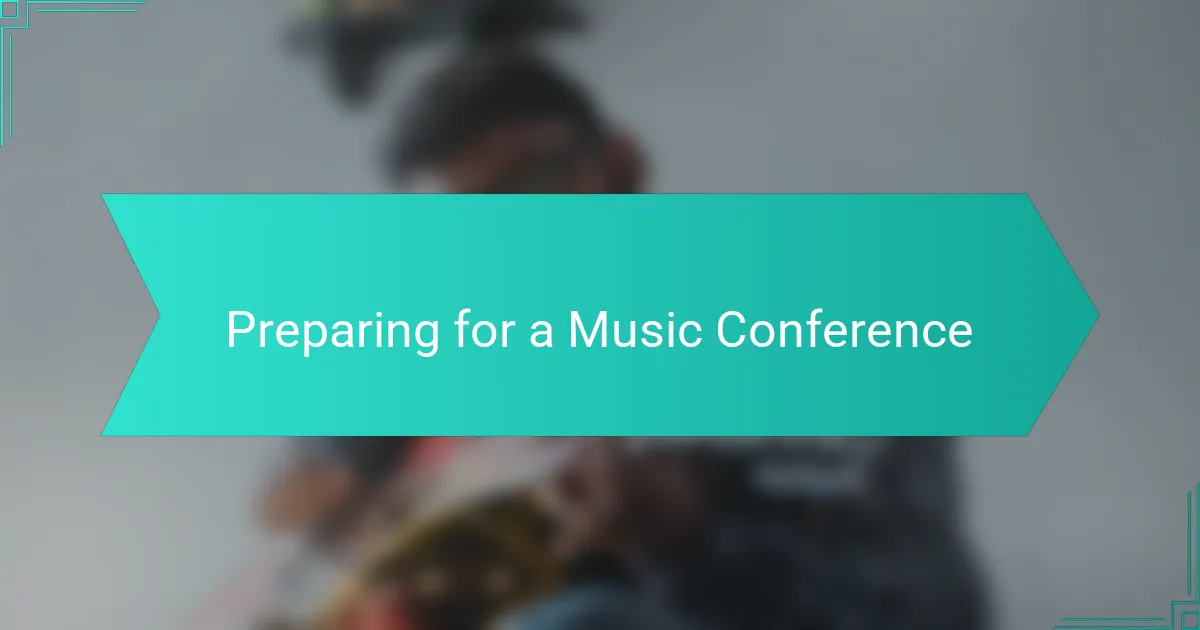
Preparing for a Music Conference
Preparing for a music conference can be both exciting and nerve-wracking. I remember my first conference; I was buzzing with anticipation but also felt a bit overwhelmed. To effectively prepare, I recommend creating a solid game plan that includes your goals for the event and a list of key people you hope to connect with.
Here’s a quick checklist to help you get ready:
- Research the conference agenda and identify sessions that align with your interests.
- Set realistic networking goals, like the number of new contacts you want to make.
- Bring plenty of business cards – I learned the hard way that running out can limit opportunities.
- Prepare a short pitch about your music or project for effective conversations.
- Plan comfortable yet professional attire to ensure you feel confident.
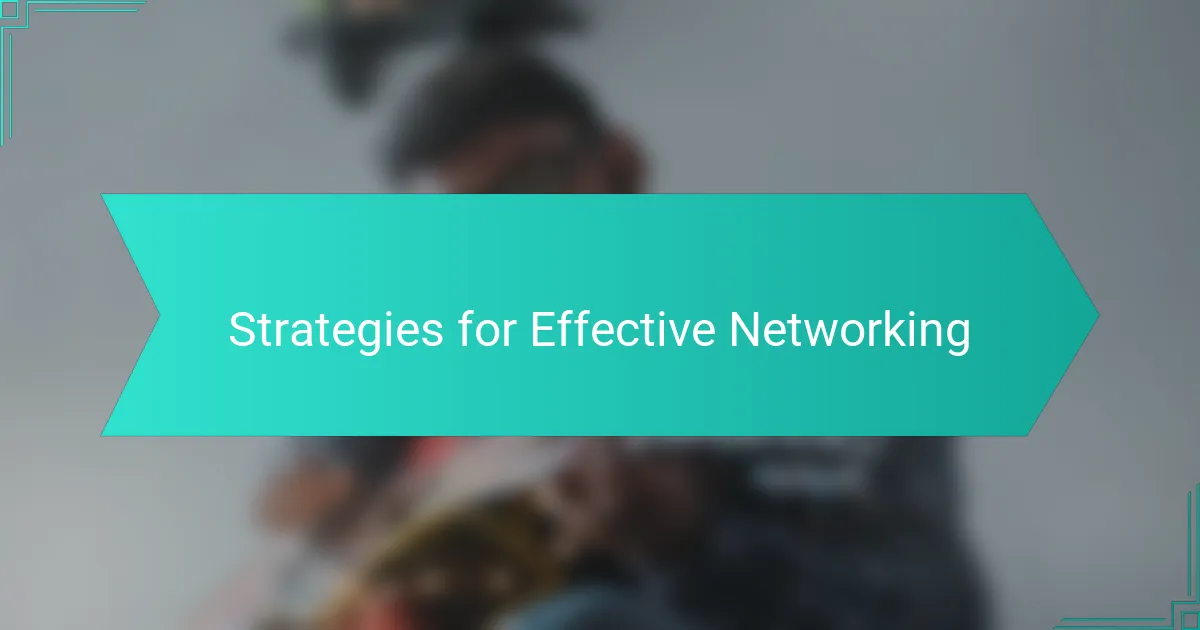
Strategies for Effective Networking
When I attend music conferences, I always approach networking with a clear strategy. I make it a point to set specific goals for each event, whether it’s meeting a certain number of industry professionals or establishing connections with fellow artists. For instance, during the last conference I attended, I aimed to connect with five new contacts. By the end of the event, I not only reached my goal but also formed a valuable collaboration that has since amplified my music’s reach.
To maximize your networking opportunities, consider these strategies:
- Bring business cards: I always carry a few to give out during conversations, making it easy for others to remember me.
- Participate in workshops: Engaging in hands-on sessions can create natural interactions and often leads to deeper discussions.
- Follow up: After the conference, I send a personalized message to my new contacts, reminding them of our conversation and expressing my interest in staying connected.
- Be genuine: I’ve found that being authentic helps to form lasting relationships rather than simply transactional ones.
- Utilize social media: Engaging with attendees on platforms like Instagram or LinkedIn can keep the connection alive long after the conference.
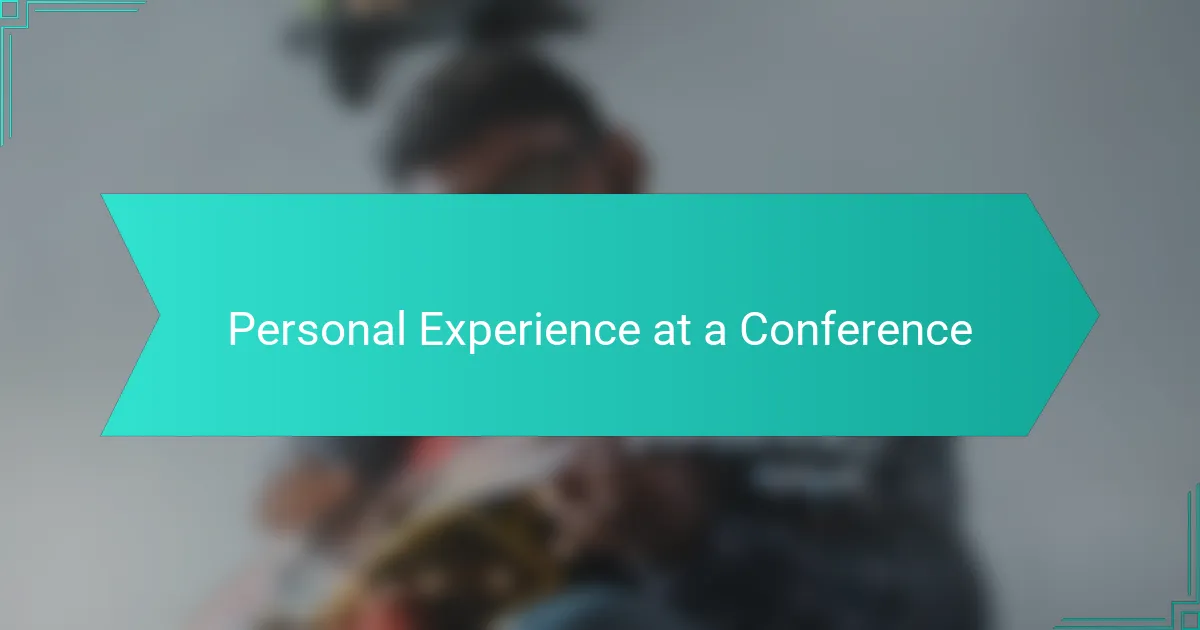
Personal Experience at a Conference
Attending a conference for the first time was a rush of excitement mixed with a hint of anxiety. I remember walking into the venue, heart racing as I scanned the room filled with musicians, producers, and industry insiders. I soon found that the energy was contagious, sparking my enthusiasm and curiosity. It felt like stepping into a world where possibilities were endless, and every conversation held the potential for something great.
One standout moment for me was when I approached a panelist after their session. With a trembling voice, I asked them about their creative process. To my surprise, they responded warmly, sharing insights that resonated deeply with my own experiences. That brief exchange opened doors—I left that conversation not only inspired but also with a newfound confidence to reach out and foster future connections. Have you ever had a moment like that? Something so simple yet so impactful that it changes your perspective entirely?
Another memorable experience was during a networking break, where I casually struck up a conversation with a fellow artist. Our chat flowed effortlessly, and we discovered overlapping musical interests. This led to a collaborative project that would have never happened without that serendipitous encounter. Moments like these remind me that you never know what a single conversation can lead to; each interaction could be the spark for your next big opportunity.
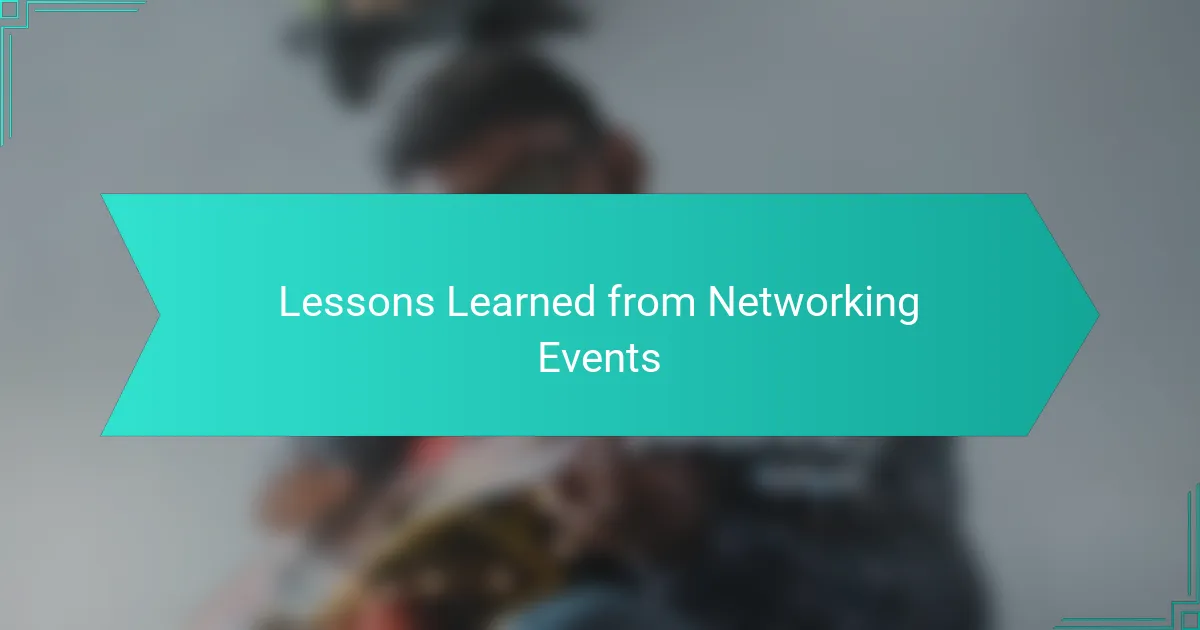
Lessons Learned from Networking Events
Attending networking events has taught me the immense power of being open and approachable. I recall one conference where I hesitated to join a group conversation, fearing I didn’t belong. But once I pushed past that initial doubt, I found myself immersed in a discussion that eventually led to a collaboration with an artist I had admired for years. Have you ever experienced that moment when you realize stepping out of your comfort zone can lead to incredible opportunities?
Another lesson I learned is the importance of active listening. During a panel discussion, I made it a point to really focus on what others were saying rather than anxiously planning my next response. This attentive approach not only allowed me to engage more meaningfully but also helped me identify potential partners whose visions aligned with mine. Wouldn’t you agree that sometimes, the best connections stem from simply being present and genuinely interested in others?
Lastly, I’ve discovered that follow-up communication can be as impactful as the initial meeting. After my first conference, I made it a habit to send a quick message to every new contact I met, mentioning our conversation to jog their memory. One time, this led to an unexpected invitation to perform at a local event, which significantly boosted my exposure. Isn’t it fascinating how a simple email can transcend a moment into a lasting relationship?
